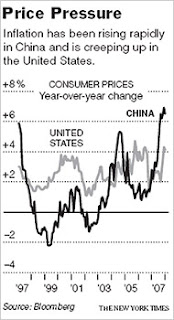 Why Does China’s Inflation Rise with the US?
Why Does China’s Inflation Rise with the US?
NY Times’ story today on “China’s Inflation Hits American Price Tags” is quite revealing. The graph shows that the inflations in the two countries indeed went hand in hand in recent time.
We finally began to see inflation passthru showing up in prices and American consumers starting to feel the hit. However, in contrary to what’s suggested in the article, that China’s rising inflation is a result of rising domestic wages and policy shift that reppealed export tax rabates, I think there are some deeper reasons.
Make no mistake, rising wages and cut of export rebates all contributed to the rising export prices, but a fundamental question is, why China’s inflation sudddently got out of control after all these calm years.
In my view, I think the inflation comes from two channels:
First, the trade and exchange rate channel. China accumulated huge trade surplus, and its foreign exchange reserves reached $1.5 trillion. In a fixed exchange rate system, to keep targeted exchange rate, central bank of China, POBC, has to buy up all the US dollars and give local currency back to exporters. This currency exchange puts extra money supply into circulation, posing a great danger of inflation. Just imagine how much more Chinese Yuan will be converted with $1.5 trillion. In reality, China’s central bank somehow mitigates this problem by issuing bonds to the market at the same time, absorbing some of this extra money. But it can hardly kill the problem. So with more trade surplus, we see money supply gradually built up, and finally now we have to face inflation again. That’s the reason why Chinese government wants to curb export and is willing to appreciate their currency now.
Second, closely related to the first one, is the investment and stock market channel. With stock market in China rising like crazy in last two years, a lot of people began to worry that Chinese market might be in a bubble. But you always hear people on the other side arguing the opposite: Chinese stocks are not overvalued, simply because Chinese firms grow a lot faster. The truth is the faster growth and investment are just a result of extra money supply from central bank’s operation. Nothing seems to stop Chinese firms from investing, even government authorities. Meanwhile, companies can’t wait to jump onto IPO wagon, raising more money and fueling another round of frenzy investment. Foreign investors also see huge opportunities provided by the skyrocketing stock market and Yuan’s appreciation. Hot money flowed in too.
So now here we are, inflation around 6% first time since mid 90s!

